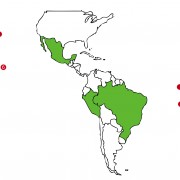Chile Legalizes Same-Sex Marriage: A Progressive Development for Latin America

Visual by: Jonathan Valenzuela Mejia
On December 9th of 2021, Chile officially legalized same-sex marriage, making it the latest country in Latin America to do so, alongside Costa Rica, Colombia, Ecuador, Brazil, Argentina, Uruguay and most states of Mexico.
The journey for Chile to reach this progressive milestone has not been easy. In 2017, former Chilean President Michele Bachelet introduced legislation to legalize same-sex marriage during the second term of her presidency, but the bill stalled without Congressional support.
Although civil unions between same-sex couples have been legal in Chile since 2015, activists and politicians alike have argued that this was inadequate given that they do not afford the same rights that marriage does. For instance, while inheritance or pensions from a partner were protected under civil unions, gay couples were not allowed to adopt children nor legally be recognized as parents of the same child. Conversely, this new bill not only legalizes same-sex marriage, but also offers increased protections for LGBTQ individuals, including the right to adoption.
Admittedly, the progress towards same-sex marriage in Chile has remained stagnant for some time. While current President Sebastián Piñera has recently communicated his support for the bill, the conservative politician has openly expressed his opposition to legalizing same-sex marriage in the past. It is a novel development, but he has made it clear that he intended to pass the legislation before his current term as President ends.
On December 7th, Chile’s Congress held a joint session and passed the bill with overwhelming majorities in both chambers. Two days later, President Piñera proceeded to sign the bill. The law will officially go into effect in March of 2022 which means same-sex marriages will be legally recognized.
Moreover, according to the Official Journal of the Republic of Chile, the government’s official publication, changes to the language in their Civil Code will be modified to become inclusive of same-sex couples and protect gender identity.
Although typically conservative, Chile is often lauded as a leader in Latin America given its relatively high human development indexes and stable economy. In finally legalizing same-sex marriage, Chile has demonstrated a shift towards progressive policies which the rest of Latin America will hopefully soon adopt.
Fittingly, people in countries such as Panama, Peru, Cuba and Venezuela are currently working on following in Chile’s footsteps to legalize same-sex marriage. Nevertheless, other nations such as Bolivia, Honduras and Paraguay still constitutionally restrict marriage as a union solely between a cis-gendered man and cis-gendered woman.
Notably, back in January 2018, the Inter-American Court on Human Rights (IACHR)—the court responsible for adjudicating matters related to the Organization of American States (OAS)—issued an advisory opinion. The Court ruled that the American Convention on Human Rights protects the right of trans individuals to officially change their name and affords same-sex couples the same protections under the law as everyone else.
Although the decision by the IACHR is non-binding, signatory countries, such as Bolivia and Honduras, might feel the pressure from other member nations of the OAS to legalize same-sex marriage and enact corresponding legal protections. For instance, the Costa Rican Supreme Electoral Court has already cited this ruling in its decision to allow its citizens to change their names based on their gender identity. Likewise, their Constitutional Court followed suit with their verdict to legalize same-sex marriage in 2020.
Ultimately, Chile’s legalization of same-sex marriage is a step forward in the right direction towards creating a more progressive and equitable Latin America. Nonetheless, there is still much work to be done in the hopes of one day being able to forge true equality for all throughout the region.











Leave a Reply
Want to join the discussion?Feel free to contribute!